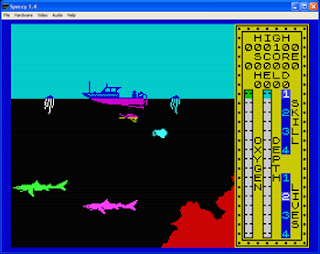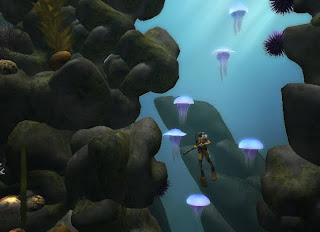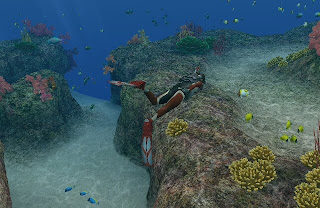I'm a diver myself; although the Endless Ocean series cannot replicate the charm and thrill of real diving it does have the same relaxing feel of floating through a hidden world simply for the pleasure of taking a look at what there is to see and exploring secret places.
It's not without it's inaccuracies in terms of the game's approach to the technique of diving; however, with Endless Ocean there appears to be an awareness of some of the detail of the sport: air is consumed more at greater depth, air is also consumed under stressful circumstances and specialised breathing equipment is required for deep dives.
Nintendo have recently released demos for some of their WiiWare releases. I thought I'd take a look at Dive: The Medes Island Secret. It has a similar visual fidelity to Endless Ocean but utilises a fixed side-scrolling camera and is akin to the retro Sinclair Spectrum game, Scuba Dive (pictured).

The game takes as its premise the search for lost gold in a Mediterranean stretch of coast. However this game almost immediately horrified me in its portrayal of the sport and the underwater environment.
You enter the sea armed with a spear gun. Fish or plants that block your path are to be shot; especially fish which "attack" in the game, depicted in the demo as Lionfish - a fish which in nature present little or no aggressive behaviour towards humans. Most injuries are as a result of divers carelessly swimming into their venomous spines.
It's bad enough that careless fishing, reckless or thoughtless divers and large shipping damage the marine life in our seas. To depict a game in which the fish can be targeted and shot with a spear is incomprehensible to me and certainly should not be present in a game based upon the sport of Scuba Diving.

In Endless Ocean, the fish are there to be studied and observed. True, in Endless Ocean 2, the player is provided with a "gun" of sorts which is used to pacify aggressive predators and heal sick fish, but this device is a suitable science-fiction idea it provides little to suggest the fish are to be harmed. In Dive, however, the fish cannot be interacted with at any level beyond shooting - in spite of the in-game shops assertion that the spear is a "tranquiliser" this is clearly a post-production addition as the in-game animation shows fish which have been shot turning upside down and floating to the surface. It is clearly a weapon designed to kill.
The ignorance of the sport does not end there. I was briefly impressed that the game depicted Oxygen Toxicity damaging the player's health when attempted to swim below a 60m depth. However, when I looked in the in-game shop for items the game depicts a "special wetsuit" which must be used for deep dives.
Research is important in any game which depicts real life sports, people or events. Dive: The Medes Island Secret displays a complete ignorance of the sport and a lack of sensitivity to the issues we have created for the marine environment.
I would heartily recommend both Endless Ocean titles for anyone looking for a reasonable replication of the sport of Scuba Diving.

The original article can be found at http://t.co/e8Vl1sv
I'm not really sure what point the article was trying to make, but it struck me that it represented quite a dated view of our perception of 'female gamers.'
Gaming is growing. That isn't just because the whole male demographic now feels it is acceptable to play videogames as a pastime; gaming is growing because it is learning to try different things and different styles. It is these approaches which have demonstrated how to not only capture the female market, but also the mature and elderly market.
Rather than simply waiting for the first true gaming generation (now arguably approaching their late thirties) to age, some game developers like Nintendo have taken the market in hand and produced games for a wider audience.
Anyhow - this is my comment from the comments section of the article:
*****************************************
I think you missed quite a lot of the impact of various games on female gamers over the years.
It is true that the majority of titles which seem to be ones which people think of and refer to as "games" seem to appeal largely to a male audience. But is it really rocket science to see that games based around shooting, motor racing or driving are aiming at a majority male audience? (although that's not to say that some of these games, like their equivalent in film or TV don't attract female fans).
I have a number of female gaming friends and the games which are popular among them are games like Assassin's Creed, Heavy Rain, Monster Hunter and particularly the Lego movie-tie-ins.
I think it's enormously contentious to suggest that women's time is any more precious than men's. I think we all commit time to the activities we enjoy and I would say that if games have not been designed with a broad appeal to the whole audience then sections of that audience will switch off after a few hours or minutes. I'd say that games such as The Sims, Animal Crossing and Theme Park have demonstrated that games full of complex gameplay that often require a large time commitment have proved popular with female gamers over the years.
While headline grabbing games like Call of Duty do continue the image of games aimed at 18-25 male audiences this represents a very small part of the gaming landscape (albeit perhaps not the financial landscape).